On the morning of November 12, the Ministry of Agriculture and Environment held the 80th Anniversary of the Agriculture and Environment sector (1945-2025) and the 1st Patriotic Emulation Congress.
General Secretary To Lam attended and spoke at the ceremony.
"The Agriculture and Environment sector has a special strategic position"
General Secretary To Lam emphasized that the Agriculture and Environment sector has a special strategic position, closely linked to land, rivers, forests, mountains, villages, cities, islands... with the lives of more than 100 million Vietnamese people. This is the sector that manages the country's vital resources such as land, water, air, forests, minerals, biodiversity and ecological environment. Every inch of land, every river, every forest, every sea is not only a space for survival and livelihood development, but also an element of national sovereignty.
Therefore, the General Secretary made it clear that developing agriculture and protecting natural resources and the environment is not only an economic task, but also a political, cultural, social, security and defense task.
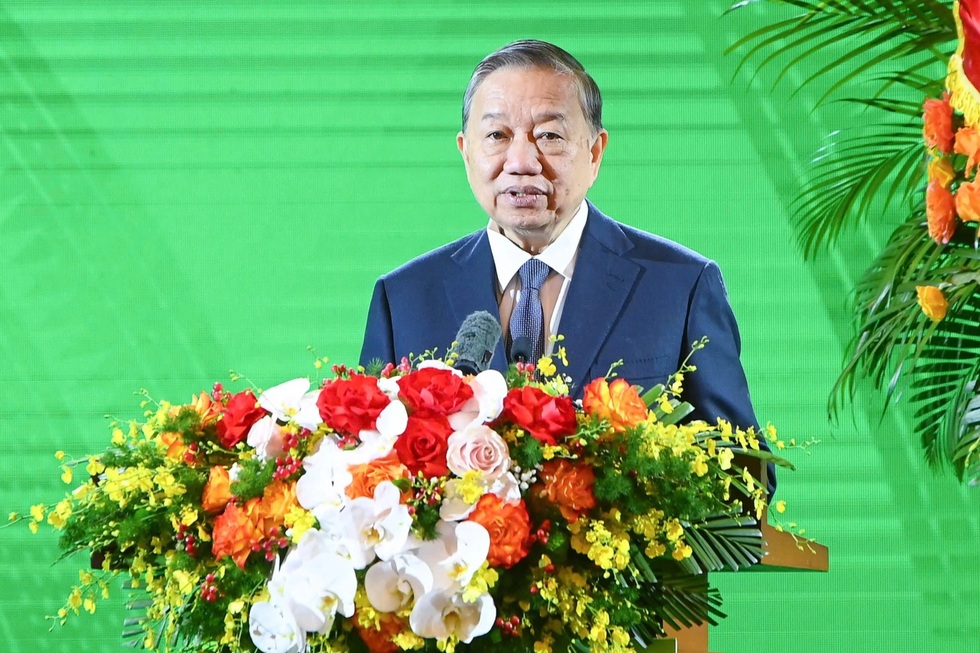
General Secretary To Lam speaks at the ceremony (Photo: Tung Dinh).
In particular, according to the General Secretary, the merger of the Ministry of Agriculture and Rural Development with the Ministry of Natural Resources and Environment to form the Ministry of Agriculture and Environment demonstrates a new development mindset of comprehensive management of resources and agricultural development in a unified and organically linked direction.
The General Secretary pointed out that the work of surveying and mapping, geological investigation, forest and sea management, and biodiversity has made much progress. Environmental protection has shifted from passive treatment to proactive prevention and control. Vietnam has made strong commitments and actions, aiming for a net zero emission target by 2050, demonstrating our responsibility to the international community and to future generations. Developing a green economy, a circular economy, and renewable energy is becoming a mainstream trend in the national development strategy.
Over the past 80 years, the Agriculture and Environment sector has always accompanied the nation and become a pillar of the economy, the foundation of livelihoods and now continues to be an important factor in the typical national development in the new era of development. The General Secretary said that these great achievements are the crystallization of the intelligence, efforts and enthusiasm of generations of cadres, civil servants, workers, farmers, intellectuals and Vietnamese enterprises, together with the attention and wise leadership of the Party and State.
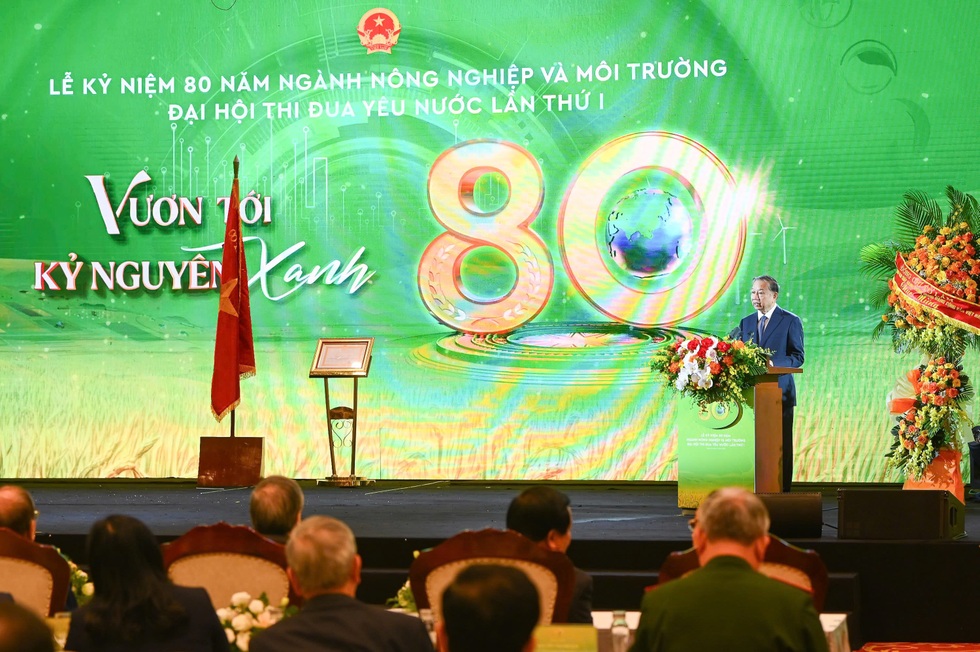
"Over the past 80 years, the Agriculture and Environment sector has always accompanied the nation and become a pillar of the economy, the foundation of livelihoods and now continues to be an important factor in the country's typical development in the new development era," said General Secretary To Lam (Photo: Tung Dinh).
On behalf of the Party and State leaders, the General Secretary commended the achievements that all cadres, civil servants, public employees and workers in the Agriculture and Environment sector have achieved through patriotic emulation movements in the 2020-2025 period, as well as throughout 80 years of construction, growth and development of the sector.
Besides the very proud results, the General Secretary also noted the need to look straight at reality: the Agriculture and Environment sector is facing many difficulties and major challenges, especially the contradictions and interweaving between economic development, resource management and environmental protection.
The General Secretary pointed out the difficulties and challenges, namely that natural resources are rapidly decreasing, the carrying capacity of the environment in many places has reached its limit. Land - the nation's special means of production, is still being wasted, fragmented, lacking overall planning; minerals are still being lost, unsustainably exploited, and water resources are declining in both reserves and quality.
Many rivers and underground water sources are being polluted and depleted; biodiversity continues to decline. Environmental pollution, especially air pollution, water pollution, and solid waste in urban areas, industrial zones, and craft villages, remains complicated, seriously affecting people's health and lives.
The impacts of climate change and extreme natural disasters are increasingly severe, causing great damage to people and property, especially in the plains, coastal and mountainous areas. Droughts, saltwater intrusion, storms, floods and landslides occur with increasing frequency and intensity, are difficult to predict, and pose a direct threat to food security as well as national ecological security.
Our country's agriculture is still not developing sustainably, the added value is still low, farmers' lives are still difficult, the gap between rural and urban areas is still large. There are still many shortcomings in the institutions and management capacity. The legal system on land, resources, and environment is still overlapping and lacking in synchronization...
“Institutional, resource, environmental, and climate change limitations, along with inherent shortcomings in agriculture and rural areas, are becoming major bottlenecks hindering the goal of rapid and sustainable development. This is not only an economic and technical issue, but also a political, social, security, and development ethics issue, requiring us to have a strategic vision and take stronger, more decisive actions in the new period,” said the General Secretary.
We must continue to improve institutions, policies and strategic foundations in the new period.
Faced with the requirements of the cause of national construction and protection, when opportunities and challenges are intertwined, General Secretary To Lam emphasized that the Agriculture and Environment sector needs to continue to innovate, act more decisively and effectively, and make worthy contributions to the success of the 14th National Party Congress, contributing to building a prosperous and sustainable country.
In particular, the General Secretary noted the need to continue perfecting institutions, policies and strategic foundations in the new period. Improving the quality of practical summaries, fully institutionalizing the Party's policies on "agriculture, farmers, rural areas", on resource management, environmental protection and climate change response into the legal system.
Continue to synchronously and efficiently complete laws on land, water resources, minerals and environmental protection, ensuring the synchronization and harmony of interests of the State, people and enterprises. Establish a mechanism to strictly and transparently control power in planning, land allocation, land lease, land use purpose conversion, and resource exploitation to avoid loss, corruption, and group interests.
Building a synchronous data system on land, water resources, forests, hydrometeorology and biodiversity; developing digital sector maps and a unified land database nationwide.
The General Secretary requested to put science and technology at the heart of agricultural production, from plant varieties, livestock, biotechnology, automation to traceability, and digital commerce. Encourage models linking scientists, businesses, cooperatives, and farmers to participate, linking added value with production facilities, not just stopping at slogans and movements.
Planning, managing and using resources effectively. Protecting the living environment, considering resources as national assets must be strictly managed, allocated reasonably, economically, effectively and sustainably.
“Water resources are vital to food security, ecological security and national security, and need to be strictly managed and fairly regulated. It is necessary to restore river, lake and groundwater ecosystems, control pollution and proactively adapt to climate change, especially in the Mekong Delta, North Central, Central Highlands and coastal regions,” the General Secretary emphasized.
Along with upgrading irrigation systems, dykes, and reservoirs; applying technology to forecast and prevent landslides and salinity; restoring protective forests, headwater forests, and conserving biodiversity, General Secretary To Lam pointed out that it is necessary to thoroughly handle environmental pollution hotspots in large cities, industrial parks, craft villages, and rivers.
Strongly reform administrative procedures; promote the strength of people and businesses; thoroughly handle bottlenecks and complicated and overlapping procedures in land, resource and environmental management.
The agricultural sector needs to shift from breadth to depth development, from increasing output to improving productivity, quality and efficiency; promote brand building, strongly develop ecological agriculture, organic agriculture, circular agriculture, and apply high technology.
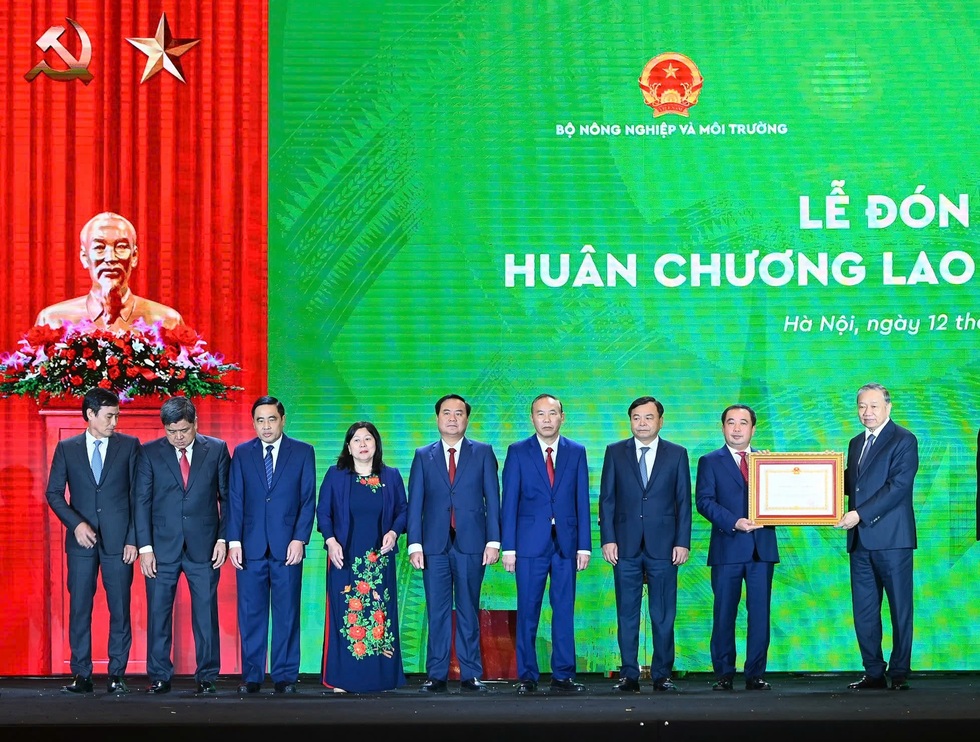
General Secretary To Lam presents the First Class Labor Medal to the Ministry of Agriculture and Environment (Photo: Tung Dinh).
For the Ministry of Agriculture and Environment, General Secretary To Lam directed to quickly perfect the organization, operate smoothly, improve management efficiency; build a team of honest, professional, dedicated, impartial and responsible cadres and civil servants to the people.
“I believe that the Agriculture and Environment sector will continue to promote its glorious tradition, strongly innovate its thinking, act decisively and effectively; dare to think, dare to do, dare to take responsibility; unite and make the greatest effort to make worthy contributions to the common success of the country,” the General Secretary expected.
At the ceremony, the General Secretary called on all cadres, civil servants, public employees, workers in the industry, scientists, businesses, cooperatives and farmers nationwide to continue to unite and be more creative, successfully implementing the set goals; successfully building the model of "ecological agriculture, modern countryside, civilized farmers". At the same time, effectively manage, exploit and use natural resources, protect the ecological environment; preserve every river, inch of land, every forest, every mountain, and the sacred sea of the Fatherland.
On this occasion, General Secretary To Lam awarded the First Class Labor Medal to the Ministry of Agriculture and Environment for its outstanding achievements in GDP growth in the Agriculture and Environment sector, making great contributions to the country's socio-economic development, contributing to the cause of building socialism and protecting the Fatherland.
Source: https://dantri.com.vn/thoi-su/nganh-nnmt-can-tiep-tuc-doi-moi-hanh-dong-quyet-liet-hon-hieu-qua-hon-20251112144632040.htm


![[Photo] Prime Minister Pham Minh Chinh attends a conference to review one year of deploying forces to participate in protecting security and order at the grassroots level.](https://vphoto.vietnam.vn/thumb/1200x675/vietnam/resource/IMAGE/2025/11/12/1762957553775_dsc-2379-jpg.webp)



![[Photo] Highways passing through Dong Nai](https://vphoto.vietnam.vn/thumb/1200x675/vietnam/resource/IMAGE/2025/11/12/1762940149627_ndo_br_1-resize-5756-jpg.webp)

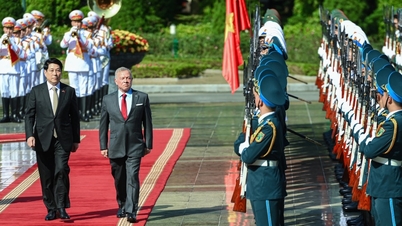
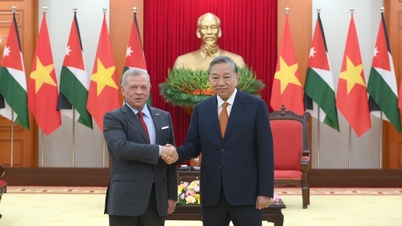

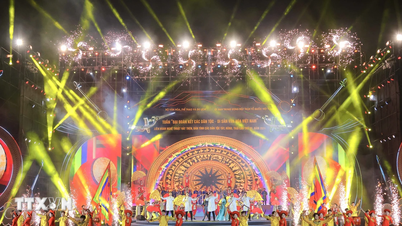

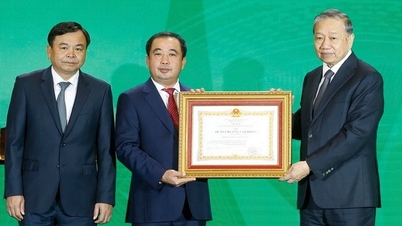



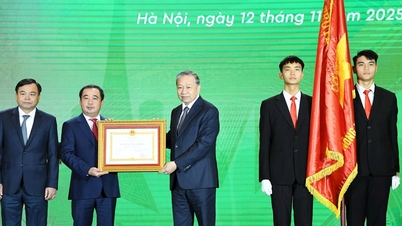




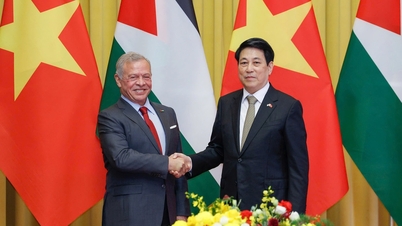
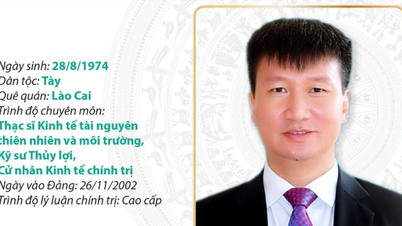
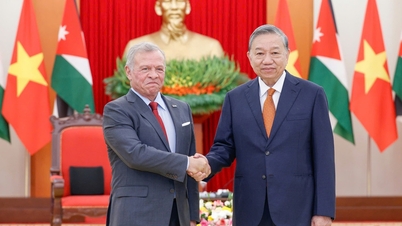
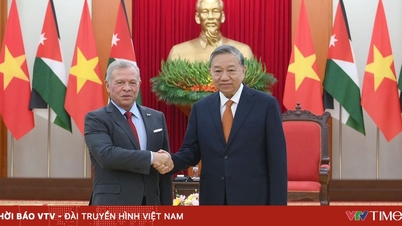






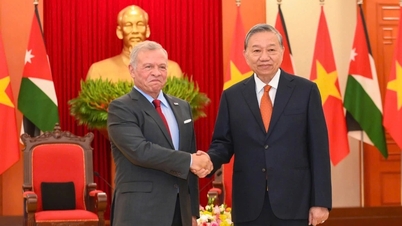









































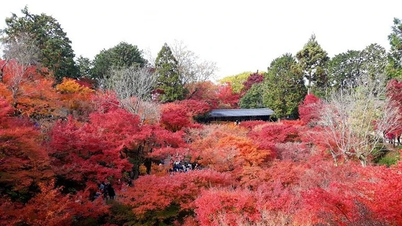






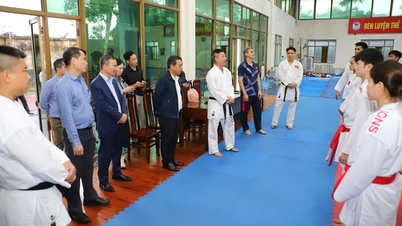




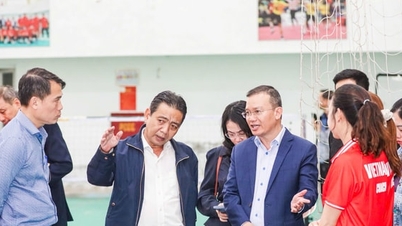

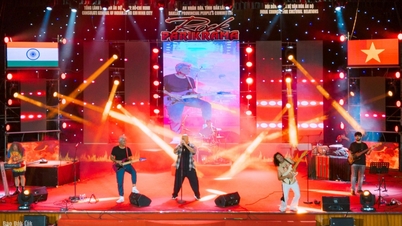











![Dong Nai OCOP transition: [Article 3] Linking tourism with OCOP product consumption](https://vphoto.vietnam.vn/thumb/402x226/vietnam/resource/IMAGE/2025/11/10/1762739199309_1324-2740-7_n-162543_981.jpeg)



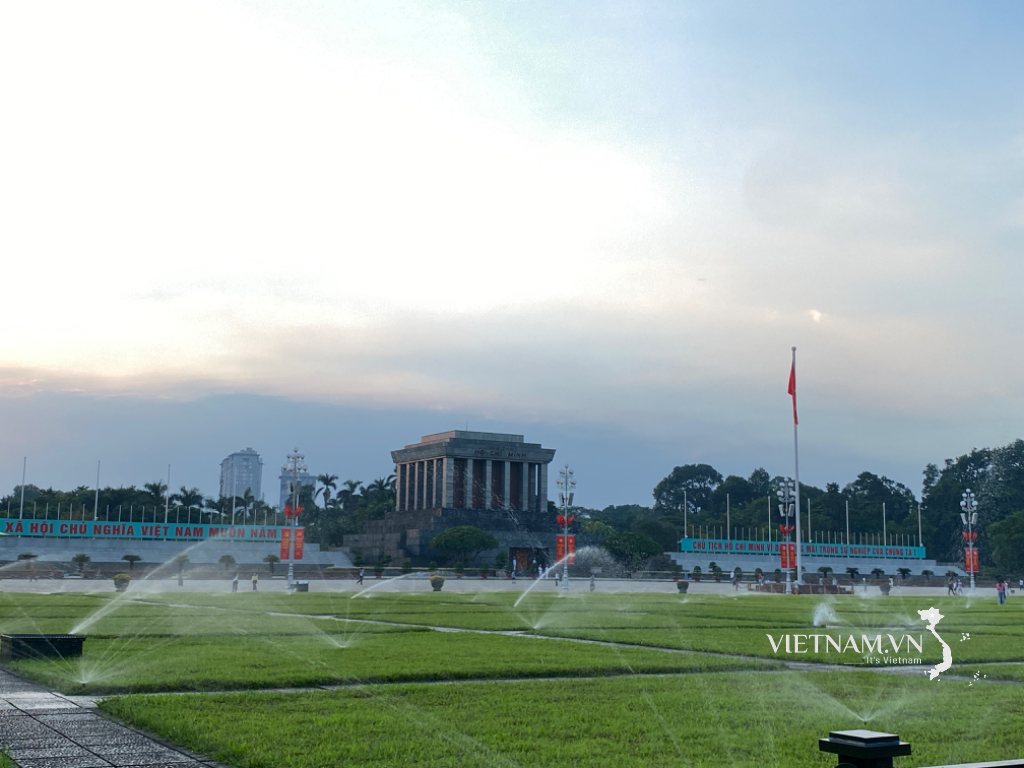


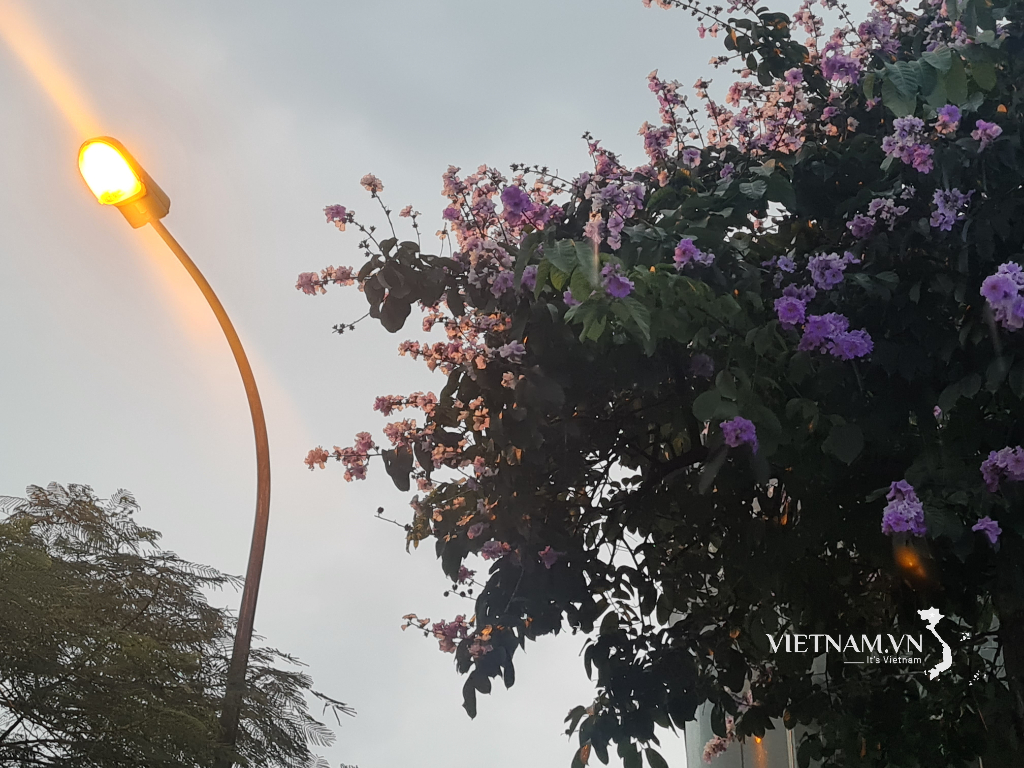
Comment (0)